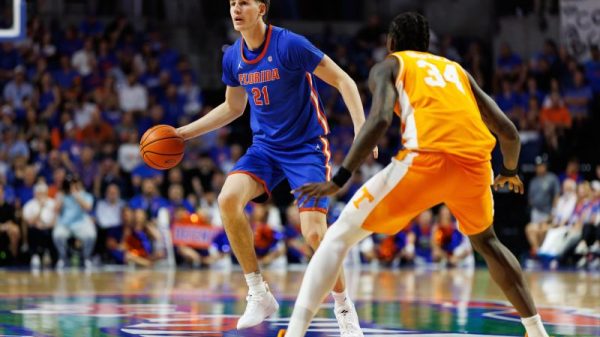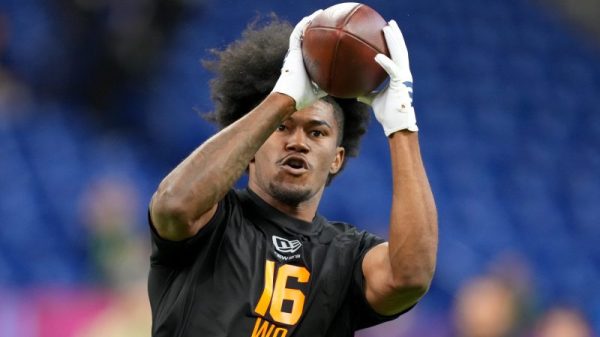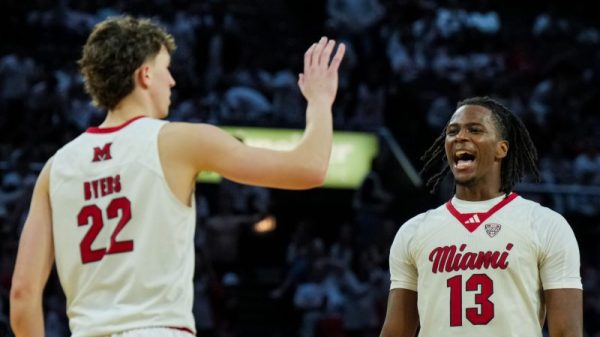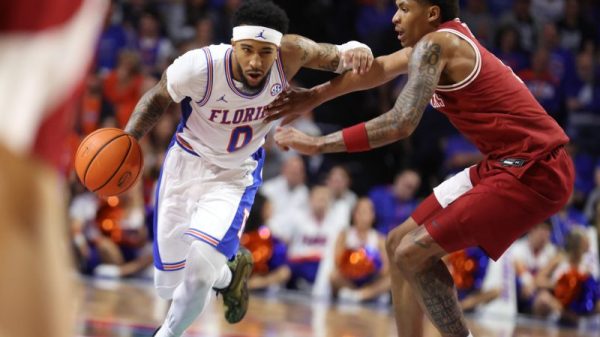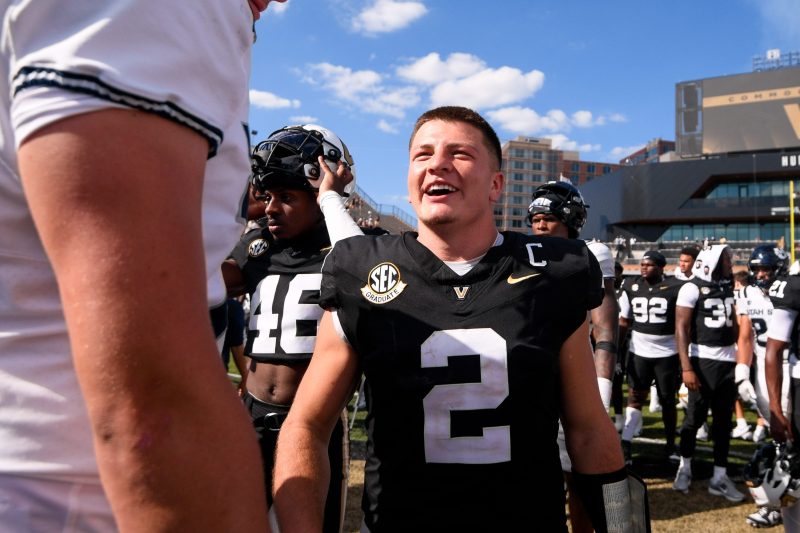Diego Pavia is full of confidence. He should be.
He won a national championship as a junior college quarterback and, if you doubted him in the SEC, he became the first Vanderbilt QB to knock off Alabama in 40 years in 2024.
Before this season, he told TV personality Paul Finebaum the perennial conference doormat could win it all.
“I wasn’t cracking a joke,’ he told Finebaum. ‘That’s the standard.’
We can use confidence to propel us forward, but can we take it too far?
It’s a question for young athletes to ponder before games they feel they should win. Often, it seems, the words just come out.
“I don’t know what they’re doing, I just focus on us, but I know we’ve got to bring it, that’s for sure,” Pavia told On3 ahead of last weekend’s rematch with the Crimson Tide. “The crowd, I think, is going to be a big factor in the game. But we just gotta play within the white lines. If we do that, if we play our game, it won’t be close.”
The problem with trash talk, even in our attempt to wrap it in conviction, is you have to be able to back it up every time, or bear the consequences.
‘We heard what he said, but we just went out and played our game,’ defensive tackle and team captain Tim Keenan said in the Tuscaloosa News after Alabama whacked Pavia and the Commodores 30-14. The key word here is “heard.”
As Vanderbilt sits idle this weekend, we can reflect on whether the quarterback’s bluster can be effective within the big picture. As younger athletes, we can think about how to channel belief in ourselves and our teammates to put us in positions to thrive, but not put our foot in our mouth.
With the MLB playoffs, and a five-time World Series champion, as a backdrop, here’s how we can use self-confidence as motivation without going overboard:
Set expectations with the team in mind
Derek Jeter reported to New York Yankees minor league camp at 18, skinny and pigeon-toed. R.D. Long, Jeter’s former roommate who was three years older and had come to the Yankees via the University of Houston, likened what he saw to Bambi.
“You look at somebody like that and you think, ‘OK this is gonna take a while,’” Long told me in 2014, just before Jeter retired as a future Hall of Famer. “You find me a position player that walked in the door looking like Derek Jeter, at 6-3, 159 and within two calendar years, makin’ a debut in the major leagues. I’d like to hear anybody tell me that they’ve seen that.
“There weren’t any expectations. He looked that weak.”
Long and Jeter became teammates in 1993 at Class A Greensboro (North Carolina). At 19, Jeter was the second-youngest player on the Hornets, and the youngest regular among a core of 21- and 22-year-olds.
Jeter committed 56 errors, his arms and feet appearing to go every which way as his throws from shortstop were wild, sometimes landing a number of rows into the stands behind first base.
At the same time, his teammates also watched one of his greatest assets at play: He seemed impossible to alienate. He befriended everyone and ensured nobody who was standing around in the clubhouse was excluded from team outings.
“I had just spent four years with people telling me how great they were at Harvard,” Nick Del Vecchio, the team’s then 23-year-old first baseman, told me almost two decades later. “ ‘Oh, I can do this, or I got a 170 IQ.’ I’m not impressed. But I was impressed with this kid. He’s incorporated a lot of the traits that my parents taught me, other parents have taught their children. And then you read about great people in history and he’s got those intangibles … whether it be perseverance or savvy as to how to overcome a certain problem.”
Del Vecchio pointed to a moment, during a losing streak, when Jeter spoke up in front of everyone.
“All right, it’s time to go out,” the first baseman remembers the shortstop saying loudly, then directing teammates toward a local restaurant. “He’s like, ‘I want to see everybody there,’ in a joking way. And everybody kind of showed up. We’re like, ‘Why were we listening to this little kid?’ But he wasn’t a little kid. Age-wise, sure, he was younger than all of us but …”
Here was a kid who had managed, almost inadvertently, to elevate himself to leadership status on a team of older players.
Derek Jeter had ‘it’: The genesis of what made the Hall of Famer a winner
Be confident, but not cocky
When he spoke to you, the 19-year-old Jeter looked you right in the eye. He wanted to know where you were from and learn about your family. If the conversation drifted to his life, he found a way to turn it back to yours.Jeter’s chats with the media tended to follow that same pattern.
“He never forced you to look at him as a leader,” says Mike Buddie, a Yankees fourth-round pick out of Wake Forest the same year as Jeter, who is now the athletic director at TCU. “It just happens. It’s one of those inherent personality traits that I think makes all great leaders.
“We’d win a game 2-1 on a two-run home run that he hit in the ninth inning and all he would talk about was what a great game our pitcher pitched … Just little things like that, consistently over time, you sit back and you think, ‘Somebody either taught him well or the kid’s just got that special ingredient that he always thinks of the team first.’ ”
That Greensboro club, the former players recalled, had a closeness, a togetherness that churned it toward the South Atlantic League championship series. Jeter was at the center of it.
Similarly, since arriving at Vanderbilt last season after two years at New Mexico State, Pavia, 24, has uplifted Vanderbilt. The Commodores raced to 7-6 last season after going 2-10 without him the year before. Their aspirations are much higher this season at 5-1.
“Diego captures the attitude of our program,” Vanderbilt football coach Clark Lea told Tennessean columnist Gentry Estes in August. “I mean, I’ve helped create that. That’s been a part of my mindset . . . When he’s on that stage and he’s saying what we believe and he’s saying it for everyone here, it’s our job then to back him up. I feel the same way when I say big things.”
Lea, though, Gentry wrote, watches for overconfidence on the practice field, for signs of a team acting like it has “arrived” and not taking care of business.
Also in August, a Netflix documentary was released in which Pavia said: “We can beat Tennessee literally any given Saturday. They think they’re going to destroy us. … (Expletive) every single one of them dudes, you know? We’re gonna win this game at all costs.”
The remarks hadn’t been released ahead of the 2024 game, which Tennessee won 36-23, but they’re out there now. The teams play again Nov. 29.
When we’re confident, we can use our actions and words to energize our teammates. When we’re cocky, we can motivate the opposition. Jeter always seemed to know the distinction.
Late in the 2003 season, infielder Aaron Boone arrived in a trade for the Yankees’ pennant run. He wasn’t sure what to expect from Jeter, who was a bona fide superstar.
“I was fortunate to play with a lot of great players, a lot of confident players and some guys that have kind of a false bravado or a way about ’em,” Boone told me after he had retired from playing, “and I just always got the feeling playing with Derek that he was the most confident guy on the field, and just a real confidence, a genuine confidence, not a bravado.
“I always felt like he has this absolute, convicted belief that, no matter what, he was gonna get somethin’ done, especially in a big spot, and that’s what I took away from him,” said Boone, who went on to manage the Yankees. “What I respected about him, was how he went about things, how he treated people, how he was all the time – not when the cameras are running.”
Talk to yourself – and keep it positive
Jeter recalled those moments when his Yankees were eliminated, too.
“Those press conferences, we’ve all been in ’em, they’re very difficult,” he said on air to Ortiz and former teammate Alex Rodriguez, “because we’ve been a part of teams where we thought, ‘We’re gonna win a World Series,’ thought we were the best team, and it didn’t happen. So I think sometimes you gotta sit down and let it all digest for a minute.”
It works the same way before we play a big game. Pause and reflect on the work you have put in and what you can accomplish, or even what you already have accomplished. Come up with your own personal mantras, a proven technique espoused by performance coaches like Larissa Mills and Kirsten Jones.
Young athletes are particularly affected by negative self-talk. But we can just as easily tell ourselves, “I feel great today!” or “I can score against her.” You might be surprised at how much better you feel, even as the underdog.
“What are the sayings you have running through your mind when things are going well?” Jones writes in her book, “Raising Empowered Athletes.” “What about when things aren’t going well? Our thoughts become actions. What I mean by that is if you are always thinking about things not working, you don’t even need to say it out loud, you can just think it and then watch it transpire.”
The best thing about self-talk is no one hears what you say to motivate yourself. It’s only when the thoughts become words that they reach opponents.
Always be yourself. It’s what makes you confident
Before he retired in 2011, longtime Yankees head athletic trainer Gene Monahan recalled that when Jeter spoke around the Yankees, he never put anybody else down. He was overwhelmingly positive.
“He’s the most positive player I’ve been around,” Monahan recalled in an interview. “He leads by example, and leads with his class, and he really knows what to say and what not to say. His stock he’s come from is incredible. His mother and father are incredible human beings. I don’t know them that well but I do know that when we are together at a social event or something, they exhume intelligence, and temperance.”
Family bonding for the Jeters meant hopping a fence behind their townhouse in Kalamazoo, Michigan, and landing in the outfield of Central High School. His parents, Charles and Dorothy, hit grounder after grounder to Derek and his sister Sharlee, who played softball.
The repetition, that time and interaction together with our family and teammates in our everyday actions, helps make us who we are.
Aria Gerson, who covers Vanderbilt for the Tennessean, wrote last week about how at its core, Vanderbilt is a run-first team football team that spreads the ball around. It’s a practice they got away from in the second half of last weekend’s game at Alabama.
She points out how Pavia ran the ball six times and attempted 20 passes in the second half, while Commodores running backs had two carries.
“Pavia can be electric at times,” she writes, “but the team isn’t at its best when he plays hero ball.”
The Commodores still have a chance to reach the College Football Playoff, something Pavia, of course, believes can still happen.
Jeter believed he could get hits off Roger Clemens and Randy Johnson, too. He just never said it out loud.
Steve Borelli, aka Coach Steve, has been an editor and writer with USA TODAY since 1999. He spent 10 years coaching his two sons’ baseball and basketball teams. He and his wife, Colleen, are now sports parents for two high schoolers. His column is posted weekly. For his past columns, click here.






